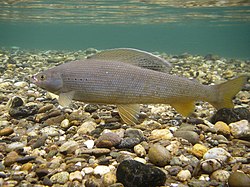Arctic Grayling
| Arctic grayling | |
|---|---|
 |
|
 |
|
| T. arcticus | |
| Scientific classification | |
| Kingdom: | Animalia |
| Phylum: | Chordata |
| Class: | Actinopterygii |
| Order: | Salmoniformes |
| Family: | Salmonidae |
| Subfamily: | Thymallinae |
| Genus: | Thymallus |
| Species: | T. arcticus |
| Binomial name | |
|
Thymallus arcticus Pallas, 1776 |
|
| Synonyms | |
|
previous scientific names
|
|
Arctic grayling (Thymallus arcticus) is a species of freshwater fish in the salmon family Salmonidae. T. arcticus is widespread throughout the Arctic and Pacific drainages in Canada, Alaska, and Siberia, as well as the upper Missouri River drainage in Montana. In the U.S. state of Arizona, an introduced population is found in the Lee Valley and other lakes in the White Mountains. They were also stocked at Toppings Lake by the Teton Range.
The scientific name of the Arctic grayling is Thymallus arcticus. It was named in 1776 by German zoologist Peter Simon Pallas from specimens collected in Russia. The name of the genus Thymallus first given to grayling (T. thymallus) described in the 1758 edition of Systema Naturae by Swedish zoologist Carl Linnaeus originates from the faint smell of the herb thyme, which emanates from the flesh.
Arctic grayling grow to a maximum recorded length of 76 cm (30 in) and a maximum recorded weight of 3.8 kg (8.4 lb). Of typical thymalline appearance, the Arctic grayling is distinguished from the similar grayling (T. thymallus) by the absence of dorsal and anal spines and by the presence of a larger number of soft rays in these fins. There is a dark midlateral band between the pectoral and pelvic fins, and the flanks may possess a pink iridescence. T. a. arcticus has been recorded as reaching an age of 18 years.
...
Wikipedia

